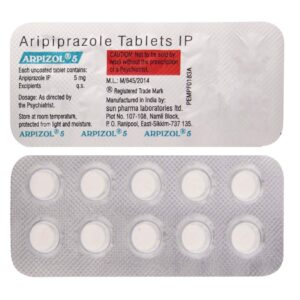Aripiprazole
Packages:
| Quantity | Per Pill | Price | Order |
|---|---|---|---|
|
20/10mg pills
Free EMS shipping with every order |
$ 2.75 | $55.00 | |
|
100/10mg pills
Free EMS shipping with every order |
$ 1.20 | $120.00 | |
|
300/10mg pills
Free EMS shipping with every order |
$ 0.73 | $220.00 |
Description:
Aripiprazole
Aripiprazole is a widely prescribed antipsychotic medication that has proven effective in the treatment of various mental health disorders. This atypical antipsychotic is known for its unique mechanism of action, which differs from traditional antipsychotics. In this article, we will explore the uses, benefits, potential side effects, and important considerations associated with Aripiprazole.
What is Aripiprazole?
Aripiprazole is an atypical antipsychotic medication primarily used to treat schizophrenia, bipolar disorder, and major depressive disorder (MDD). Marketed under brand names such as Abilify, Aripiprazole functions as a partial agonist at dopamine D2 and serotonin 5-HT1A receptors while acting as an antagonist at serotonin 5-HT2A receptors. This unique pharmacological profile allows for a balance between dopamine and serotonin levels in the brain, reducing symptoms of psychosis and mood disorders.
Medical Uses of Aripiprazole
Aripiprazole is prescribed for various psychiatric conditions, including:
Schizophrenia: It is commonly used to manage both positive (hallucinations, delusions) and negative (withdrawal, lack of emotion) symptoms.
Bipolar Disorder: Often prescribed to treat manic and mixed episodes, either alone or in combination with other mood stabilizers.
Major Depressive Disorder (MDD): Used as an adjunct therapy in patients who do not respond adequately to antidepressants.
Autism Spectrum Disorder (ASD): Helps in managing irritability and aggression in children and adolescents with ASD.
Tourette Syndrome: Reduces tics and involuntary movements in affected individuals.
Benefits of Aripiprazole
Lower Risk of Weight Gain: Compared to other antipsychotics, Aripiprazole has a lower likelihood of causing significant weight gain.
Reduced Sedation: It is less sedating than many other medications in the same class, making it suitable for individuals who need to remain alert.
Fewer Extrapyramidal Symptoms: Unlike first-generation antipsychotics, it has a lower risk of movement disorders such as tardive dyskinesia and akathisia.
Long-Acting Injectable Formulation: Available as an extended-release injection (Abilify Maintena), which enhances compliance by reducing the need for daily dosing.
Potential Side Effects
While Aripiprazole is generally well-tolerated, it can cause some side effects, including:
Common Side Effects: Nausea, dizziness, headache, restlessness, constipation, and mild anxiety.
Serious Side Effects: Increased risk of suicidal thoughts (especially in younger individuals), neuroleptic malignant syndrome (NMS), tardive dyskinesia, and metabolic changes such as increased blood sugar or cholesterol levels.
Rare But Severe Effects: Impulse control issues (such as compulsive gambling, shopping, or eating), orthostatic hypotension, and allergic reactions.
Important Considerations Before Taking Aripiprazole
Drug Interactions: Aripiprazole may interact with medications such as certain antidepressants, antifungal drugs, and anticonvulsants.
Medical Conditions: Patients with a history of cardiovascular disease, diabetes, or seizures should use Aripiprazole with caution.
Pregnancy and Breastfeeding: While limited data is available, the medication should only be used if the benefits outweigh the risks.
Alcohol Consumption: Combining Aripiprazole with alcohol can enhance side effects such as drowsiness and dizziness.
Several alternatives to Aripiprazole (Abilify) are available, depending on the condition being treated. These alternatives include other atypical (second-generation) antipsychotics, first-generation antipsychotics, and mood stabilizers. Here are some options:
Atypical Antipsychotic Alternatives
These medications work similarly to Aripiprazole by balancing dopamine and serotonin levels but may have different side effect profiles.
- Risperidone (Risperdal) – Effective for schizophrenia, bipolar disorder, and autism-related irritability but may cause weight gain and sedation.
- Olanzapine (Zyprexa) – Stronger sedative effects, often used for schizophrenia and bipolar disorder but has a higher risk of weight gain and metabolic issues.
- Quetiapine (Seroquel) – Used for schizophrenia, bipolar disorder, and depression; known for sedative effects and may help with sleep issues.
- Ziprasidone (Geodon) – Less likely to cause weight gain but may require meals for proper absorption.
- Lurasidone (Latuda) – Effective for bipolar depression and schizophrenia with a lower risk of weight gain.
- Clozapine (Clozaril) – Reserved for treatment-resistant schizophrenia due to the risk of agranulocytosis (a rare but serious blood disorder).
First-Generation Antipsychotics
Older antipsychotics with a higher risk of movement disorders but still effective in treating psychotic symptoms.
- Haloperidol (Haldol) – Used for schizophrenia and Tourette syndrome, but has a higher risk of extrapyramidal side effects (muscle stiffness, tremors).
- Chlorpromazine (Thorazine) – Used for schizophrenia and severe behavioral disorders but may cause drowsiness and weight gain.
- Fluphenazine (Prolixin) – Long-acting option available for schizophrenia treatment.
Mood Stabilizers (for Bipolar Disorder)
If Aripiprazole is being used for bipolar disorder, these alternatives may be considered:
- Lithium – A traditional mood stabilizer effective in preventing manic and depressive episodes.
- Valproate (Depakote) – Useful for acute mania but may cause weight gain and liver enzyme elevation.
- Lamotrigine (Lamictal) – Primarily used for bipolar depression with fewer sedative effects.
- Carbamazepine (Tegretol) – Used for bipolar disorder but has drug interaction concerns.
Adjunctive Therapies for Depression
If Aripiprazole is being used as an add-on for major depressive disorder, these options may help:
- Brexpiprazole (Rexulti) – Similar to Aripiprazole but may have a lower risk of restlessness (akathisia).
- Quetiapine (Seroquel XR) – Approved for depression adjunct therapy, with sedative effects.
Each medication has its own benefits and side effects, so the choice of an alternative depends on individual response, tolerance, and medical history. Consulting a healthcare provider is essential before switching medications. Do you need recommendations based on a specific conditio
Conclusion
Aripiprazole is a versatile and effective medication for managing schizophrenia, bipolar disorder, depression, and other mental health conditions. Its unique pharmacological action provides benefits over traditional antipsychotics, such as lower sedation and a reduced risk of weight gain. However, like all medications, it comes with potential side effects and requires careful monitoring. Patients should always consult their healthcare provider before starting or adjusting their Aripiprazole dosage to ensure safe and effective treatment.
